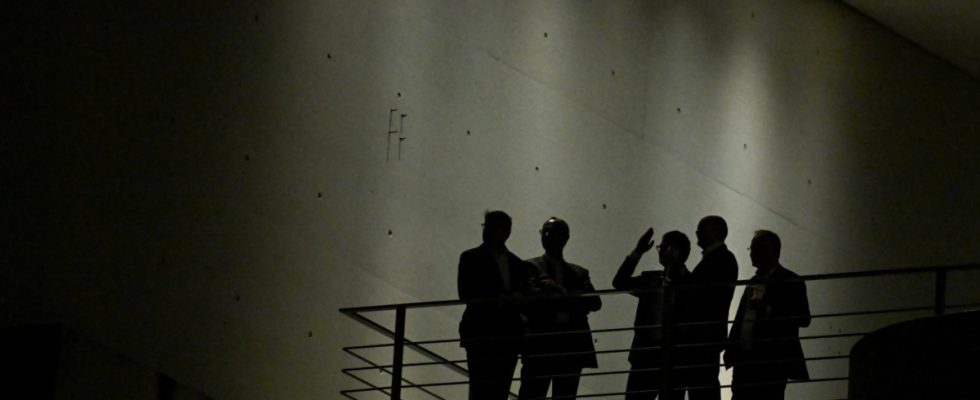He wanted to get in there – and now he’s in there. Friedrich Merz arrived at the Chancellery in the early evening. Together with the Prime Ministers of Hesse and Lower Saxony, Boris Rhein and Stephan Weil, he is received by the landlord in the Chancellor’s apartment on the eighth floor. Olaf Scholz first leads the CDU chairman and the two country leaders onto the balcony. The head of the Chancellery, Wolfgang Schmidt, is also there. You drink a glass of wine. It’s an unusually warm autumn evening in Berlin – and at least from a distance the mood seems relaxed. The meal, which includes veal schnitzel and fried potatoes, is about what is probably the most politically explosive issue in Germany at the moment.
Merz has been offering the Chancellor for weeks to work together on migration policy. The CDU leader has said again and again that he will extend his hand. But he and Scholz had not yet gotten together. In the Chancellery, Merz is suspected to be more interested in party tactics than actual interest. At least there is this meeting on this Friday evening. After the state election results, which were disastrous for the traffic light parties, the Chancellery seems to think it is necessary to send a signal: We are cooperative.
“It was really a very good day today”
But Merz is not allowed to appear together after the meeting in the Chancellery. And there are no joint decisions either. Government spokesman Steffen Hebestreit had already lowered expectations for the round before it began. First of all, it was an “informational discussion” and an “exchange of opinions,” said Hebestreit.
And so after the meeting there is only a press conference by Rhein (CDU) and Weil (SPD) in the Hessian state representation. The conversation was “very constructive” and took place in a “very good atmosphere,” praises Rhein. “It was really a very good day today,” adds his colleague Weil. Both also agree that a paper previously passed by the federal states in Frankfurt laid the foundation for a rapprochement between traffic lights and the Union at the federal level. After all, country leaders from five parties are represented in the Prime Minister’s Conference. The states have provided a “steep template,” says Weil. “Transforming the ball – that’s what federal politics has to do now.”
However, the picture is not quite as harmonious as drawn by Rhein and Weil. Merz brought his version of a Germany pact to limit illegal migration to the Chancellery. Germany can tolerate “asylum immigration of up to a maximum of 200,000 people per year,” it says. That’s not an explicit upper limit, but it probably sounds too much like it for Scholz. Nevertheless, the Chancellery said afterwards that it was “a friendly and constructive conversation”. There was consensus that Democrats must stick together. The federal government, the states and the opposition have now set out on a common path.
And Merz? After the meeting he was interviewed by ZDF. It was “a very good conversation in terms of atmosphere,” says the CDU leader. He got the impression “that the Chancellor now really wants to talk seriously about limiting immigration to Germany.” They have agreed to meet again shortly. There seems to be agreement on the goal, says Merz. But it is also clear: “The numbers have to come down.”
The situation in the Middle East, the decision states, could lead to even more refugees coming
Before the meeting in the Chancellery, the prime ministers of the federal states had already met in Frankfurt. Across party lines, they demanded a significant tightening of migration policy and more money from the federal government. “The measures taken so far are not yet sufficient to limit irregular migration,” says the decision of the Prime Minister’s Conference (MPK). The problems with the accommodation and integration of the extraordinarily high number of asylum seekers are already resulting in “significant financial and organizational burdens” and are unsettling society. The situation in the Middle East could lead to even more refugees arriving in the coming weeks and months.
Given this situation, Germany’s willingness to accept refugees is in danger of being “largely lost,” according to the MPK decision. In many cases there is a growing “feeling of being overwhelmed”. There is now widespread political agreement that the number of people admitted must be significantly reduced and irregular immigration must be “stopped immediately”.
The states therefore called on the federal government in Frankfurt to take effective measures to speed up the asylum process, to prevent unauthorized entries, for example through stationary border controls at the borders with the Czech Republic and Poland, and to create the conditions for the introduction of a nationwide uniform payment card for asylum seekers. The Prime Ministers also asked the Federal Government to work towards more effective protection of the EU’s external borders and strengthening Frontex.
However, it is particularly important for the federal states to provide greater financial support. Boris Rhein, the new MPK chairman, said in Frankfurt: “The federal government has to make significant moves here, that’s clear.” In addition to a “refugee-related flat rate of 1.5 billion euros,” the states are also demanding at least 10,500 euros per refugee per year. Immediately after the meeting in Frankfurt, Rhein and Weil then traveled to Berlin to attend the meeting with Scholz and Merz.
And what happens now? Far-reaching decisions are not expected until the next federal-state meeting on November 6th. Of course Scholz is there too.

